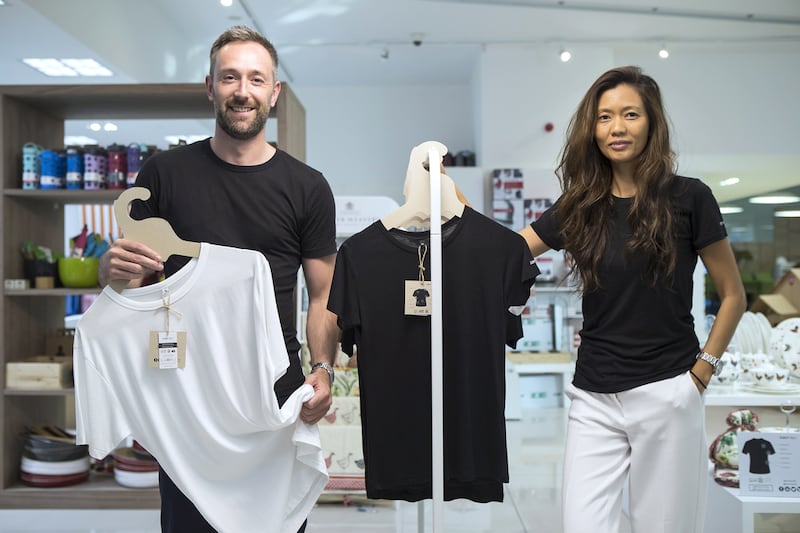When entrepreneurs Matthew King and Aimee Changco launched a new clothing company, they did so with a difference.
While selling black and white T-shirts for Dh250 a piece might not sound unusual, what sets them apart is the fabric they use – it’s 70 per cent bamboo fibre and 30 per cent organic cotton. And the company strives to conform to ethical and ecological standards.
The entrepreneurs launched the start-up last summer, and say they were careful to ensure sourcing and manufacturing took place in an environmentally and socially conscious way.
“Even the ink and printing process has to be ecologically as good as you can get,” says Mr King, from the UK, explaining that the manufacturing process takes place in a factory that treats employees fairly, the bamboo is grown in an eco-friendly way and the cotton is organic.
Bamboo is a renewable resource: it’s naturally pest-resistant and grows fast, so it doesn’t require fertilizers or pesticides to grow, and to ensure this is the case, the company has chosen a supplier that is accredited by the Soil Association. To turn the bamboo into fibres, the plant is pulped using chemicals: 10 years ago, this process generated harmful waste, but now, Mr King says, the production is a “closed loop”. This means the same chemicals are reused over and over, and very little is released into natural ecosystems.
To turn the fabric into clothing, Baembu says it uses one of a few factories in Turkey adhering to the Fair Wear Foundation and Confidence in Textiles benchmarks, then appropriate retailers are chosen to sell the finished T-shirts, which are also available online.
Baembu was self-funded by the two partners, and Mr King, 38, still works a day job at a digital printing company, while Ms Changco, 39, from Singapore, also advises companies on creative and social media strategy.
The first batch of stock was sold at the Dubai pop-up market Outside the Box in January where the T-shirts sold out the day before the event ended – much of it to Emirati women looking for a base layer to wear under their abayas. Currently, the T-shirts are stocked at the fitness studio Urban Yoga, and The Change Initiative, the sustainable store in Al Quoz.
The entrepreneurs declined to share investment and profit figures, saying that they didn’t think it would reflect where they would be by the end of the year.
The T-shirts are simple, but they have a few USPs. According to the company, the bamboo-fibre fabric is softer than cotton; it wicks sweat away from the body and gently follows the wearer’s form without clinging.
But it’s the brand’s ethical focus that the entrepreneurs have used to market their company.
During Ramadan, Baembu organised a gift scheme for low-income labourers living in a workers’ village in Muhaisnah, in the north of the city.
Using their blog, which posts updates on ethical consumption, they posted instructions on how to turn a shoebox inside out and reconstruct it, then fill it with gifts that could be of use to low-income migrant workers. Suggested items were international phone cards, toothbrushes, sachets of electrolyte powder, coffee and tins of tuna.
After sharing the page on social media with the hashtag #ShoeboxLove, the campaign went viral within hours. Just over 600 filled shoeboxes were left at Baembu’s drop-off points, which the business duo handed over to workers at a mosque.
"We want to be able to say that we're influencers, that we have a positive impact environmentally, sustainably, socially," says Mr King, who plans to run the Ramadan campaign again next year. The next event the pair are organising is an invite-only screening of the disposable-fashion documentary True Cost, scheduled for late August or September.
Responsible consumption represents a growing market share, many reports show, including a 2014 Boston Consulting Group study showing that ethical products grew about 9 per cent annually in the US during the previous three years.
Tena Pick, a Dubai-based social impact consultant, says the city is a relatively new market when it comes to truly ethical and sustainable brands. “But both the expat and local communities are looking for ways to vote with their wallet and support brands that are aligned with their personal value systems,” she says adding that if campaigns like #ShoeboxLove are honest rather than a photo op they can be a great way to spread a company’s message
Mr King and Ms Changco are confident Baembu lives up to this standard. “Sustainable products are not just a fad,” Mr King adds. ”There is a growing consciousness of all that, and I don’t think it will die.”
business@thenational.ae
Follow The National's Business section on Twitter





